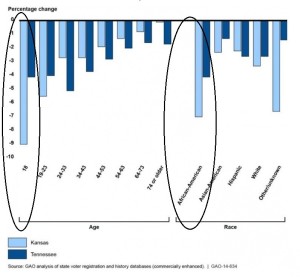CAP Report – Mississippi Democracy Rock Bottom
2015/07/21 –
Mississippi has, once again, hit the lowest rung in terms of democracy. A new report released by the Center for American Progress puts Mississippi deep in the list of failed states, filling the South, that have moved to restrict voting and trounce the democratic process.
The report, “Health of State Democracies,” focuses on 22 individual factors such as availability of preregistration, online voting, in-person early voting, as well as voting wait times, restrictive voting requirements, and felony disenfranchisement laws, and determined that Mississippi earned an “F” grade regarding overall voter inclusion.
“The way this report reads, it seems like Mississippi legislators are terrified of certain voters and do not want them to participate in elections,” said MSNAACP President Derrick Johnson. “Years after Mississippi had to be bullied into complying with the U.S. Constitution, we are still straggling in 2015.”
Mississippi, a state with an embarrassing southern heritage of disenfranchising black citizens, continues, for example, to yank away a fundamental American right by not allowing ex-felons to vote, even if their crimes included writing a bad check. Even if the crime was non-violent, poverty-related, or the “felon” served no time, Mississippi retains the exact same felony disenfranchisement law white segregationists created at the height of the brutal Jim Crow era — a law created exclusively to remove black votes.
Besides offering absolutely no online voter registration, portable registration or voter preregistration for 16- and 17-year olds, the state also offers very little compliance with Motor Voter provisions created federally in 1993. Motor Voter requires states to provide voter registration opportunities when citizens interact with a state’s motor vehicle department or other state agency offering public assistance. The report cited Mississippi’s and Alabama’s “extremely low ratios of DMV voter registrations to DMV licenses issued….” The ratios are so low that report authors actually worried that they raised “concerns that these states may be out of compliance with the National Voter Registration Act.”
Sadly, Mississippi also participates in a bogus voter checking system, the Interstate Crosscheck database system, which allegedly identifies voters potentially registered to vote in more than one state. The system, created by Republican Kansas Secretary of State Kris Kobach, a notorious witch-hunter for nonexistent vote fraud, brainlessly flags identical names across state lines, without respect to name suffixes like “Jr.,” “Sr.,” and “III.” It also does not compare Social Security numbers. The witless system flagged roughly 7 million names of potential double voters prior to the 2014 election — and not a single flagged person “has been convicted of double voting pursuant to Crosscheck data,” according to the report.
For an opportunistic Republican, however, the system has the advantage of overwhelmingly flagging ethnicities that have less variety in names, particularly blacks, Hispanics and Asian-Americans — groups that tend to vote Democratic. “While white voter names are underrepresented (by Interstate Crosscheck) by 8 percent, African American voters are overrepresented by 45 percent, Hispanic voters are overrepresented by 24 percent, and Asian voters are overrepresented by 31 percent,” the report states.
Political leaders who are afraid of minority and youth voters also tend to favor extreme voter restrictions like photo ID requirements, confident that youth and minorities are less prone to possess photo ID. In the last five years, it appears that Republican politicians have only increased their love of Voter ID the more they hear of its lopsided impact on black and young voters. Mississippi Republicans overwhelmingly favored the measure in 2012, even after the release of numerous reports showing the restrictions heavily reduced voter turnout. Even the federal government’s own Government Accountability Office determined that harsh new voter ID laws in Kansas and Tennessee reduced 2012 turnout by at least 1.9 percentage points in Kansas and 2.2 percentage points in Tennessee. The Washington Post calculated that the laws turned away about 122,000 voters.
Mississippi GOP leaders have not attempted to rescind the restriction since the release of the damning GAO report.
Further dragging down the state’s democratic record is the fact that Mississippi voters have no access to early voting, limiting the vote to only one day. This single-day poll battle potentially knocks low-wage workers out of the voting pool if their work schedule conflicts with voting hours that day. Many low-wage employees suffer high-volume customer service duties that make it difficult to take the time necessary to wait in line and vote at polling areas. While absentee ballot voting is still possible, many low-wage employees’ erratic work schedules make it difficult for them to predict when an absentee ballot vote will be necessary.
Mississippi Republicans are, predictability, openly hostile to allowing more days to vote, even going so far as to kill an early incarnation of one of their own beloved voter ID bills in the Mississippi Legislature in 2009 specifically because it contained language making early voting possible. At the time, opponents couched their opposition in sham arguments regarding voter fraud. Then-State Senator Merle Flowers declared in 2009, for example, that he voted to kill the bill because “allowing 15 days is 14 more days to cheat than we have now.” Governor Phil Bryant, meanwhile, declared that favoring early voting and adding any convenience to a voter’s life amounted to “back[ing] down from my Republican, conservative principles.”
Source: NAACP Writing Staff




